Let me take you on a little journey into the world of Boeing, one of the biggest names in the aerospace industry.
I've spent a lot of time analyzing different businesses and figuring out what makes them tick. I’ve seen firsthand how companies rise and fall based on their strengths, weaknesses, opportunities, and threats—what we call a SWOT analysis.
Now, Boeing is a fascinating company. They build everything from commercial airplanes to spacecraft. But like any big player, they have their ups and downs.
In this analysis, I'm going to break down what makes Boeing strong, where they struggle, the exciting opportunities they have, and the challenges they face.
Think of it like this: imagine being on a sports team. You need to know what you’re good at (strengths), what you need to improve (weaknesses), the big game opportunities coming up (opportunities), and the tough opponents you'll face (threats). Boeing has a lot of these going on, and understanding them can help us see what the future might hold for this giant of the skies.
I’ll walk you through each part in a way that makes sense, so you can get a clear picture of what’s happening with Boeing.
History of Boeing

Boeing, the American giant in aerospace, is renowned for its military aircraft, helicopters, space vehicles, missiles, and especially its commercial jet transports. Founded by William A. Boeing in 1916, the company initially sold airplanes to the US Navy. Over time, Boeing expanded its horizons, introducing a variety of new products and entering different markets. Today, its headquarters are in Chicago.
Originally known as the Boeing Airplane Company, the name changed in 1961 to reflect the company’s broader ambitions beyond just airplanes. Despite their diverse product range, Boeing's primary claim to fame remains its aircraft. The company manufactures seven distinct families of aircraft, assembled in three major facilities.
Boeing’s name is widely recognized, even by those unfamiliar with aircraft, due to its century-long presence and significant market impact. Beyond commercial airplanes, Boeing is a major player in the military and space & communications sectors. The company has a history of strategic partnerships, mergers, and acquisitions, which have bolstered its capabilities and market position.
Boeing operates in three primary sectors: Commercial Airplanes; Defense, Space & Security; and Boeing Global Services. This last sector is a newer addition, focusing on service-oriented solutions. Within the organization, various departments handle functions such as engineering, safety, technology, finance, advanced design, quality, productivity improvement, program management, and information technology.
With a workforce of nearly 171,000 people across 65 countries, Boeing boasts a diverse and innovative team. This extensive network not only drives the company’s success but also provides ample employment opportunities worldwide.
Additionally, Boeing has established the Boeing Capital Corporation (BCC) to offer financial solutions to its customers. BCC ensures that customers have the necessary financial support to purchase Boeing products, backed by a team of finance professionals delivering expert financial services.
Overall, Boeing’s rich history and strategic growth have made it a leader in the aerospace industry, continuously evolving and overcoming challenges with innovative solutions.
Boeing’s Strengths
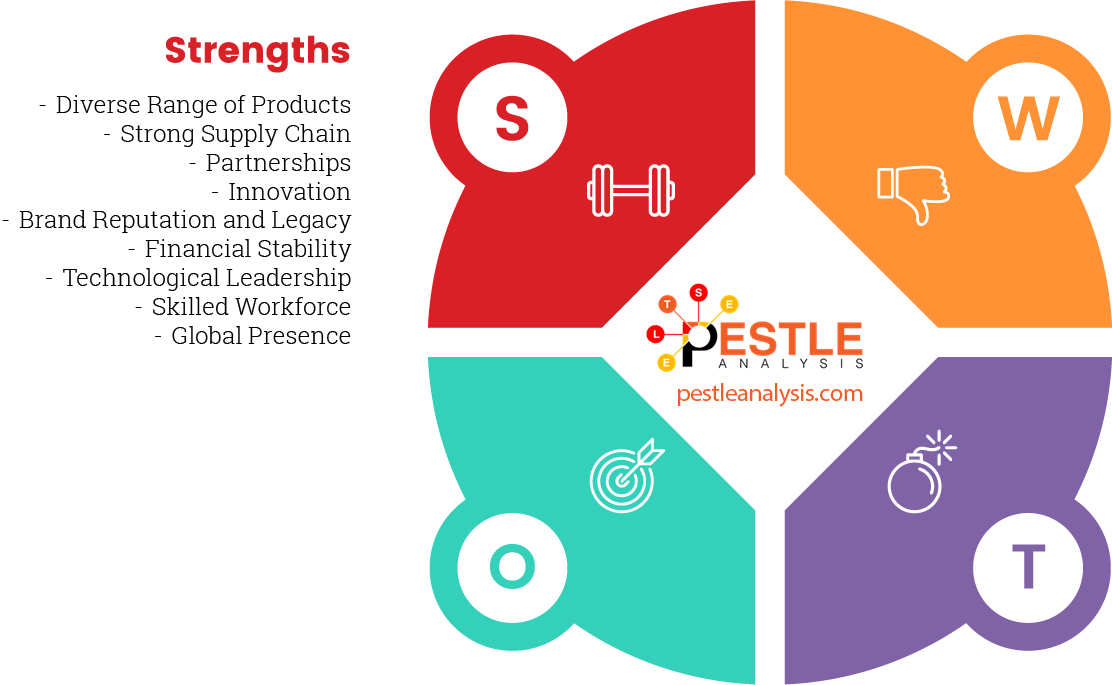
Brand Reputation and Legacy
Boeing is one of the most recognizable names in the aerospace industry, with a rich history dating back over a century. This legacy and brand reputation instill trust and confidence among customers, partners, and stakeholders.
Financial Stability
Boeing's strong financial position enables it to invest heavily in research and development, as well as to weather economic downturns better than many of its competitors. This financial robustness supports long-term strategic planning and innovation.
Diverse Range of Products
One of the biggest strengths of the company is that it delivers a wide range of products. Whatever kind of airplane people need to purchase, Boeing will probably have it available. This gives the company a lot of edge over other competitors that offer only a limited range of products.
Boeing offers commercial planes, private jet planes, corporate jets, and many others too. The company has strategically developed itself in a way to provide many products and services that make it a leading supplier in the market.
Global Presence
Boeing's extensive global footprint includes manufacturing facilities, service centers, and partnerships across various continents. This worldwide presence ensures better market penetration and service delivery, making Boeing a truly global player.
Customer Loyalty
Due to its high-quality products and services, Boeing enjoys a high level of customer loyalty. Airlines and defense contractors often prefer Boeing for their long-term needs, leading to repeat business and sustained relationships.
Strong Supply Chain
The way that Boeing manufactures its products requires it to buy raw materials from various places all over the world. To ensure that this process is carried out smoothly, the company needs to develop a supply chain that is efficient and strong, and it did just that.
They make sure that all the raw materials and individual components are received timely, and then the final product is manufactured and delivered to customers on time as well.
Partnerships
Partnerships pave the way for a company’s success in many ways. Boeing has strategically partnered up with relevant companies that are big names and hence provide mutual benefit to both brands. They have partnered up with companies from all over the world and achieved many bounties out of it.
They have also established solid and meaningful relationships with these partners and ensured them of their value to their brand. Focusing on partner relationships can be really favorable for a company in the long run. Hence, this has proved helpful for Boeing.
Innovation
Today, the most valuable brand in the industry is the one that has the highest levels of creativity and innovation. There is so much competition that you need to bring something unique to the table that sets you apart from everyone else. Boeing has a huge name for being innovative, and it is incredibly famous for its drive to keep bringing out new ideas.
They have brought many valuable changes to the airline industry through their inventions, such as lightweight carbon composites and innovative fuel efficiency technologies. Boeing gives serious competition to other firms in the market and forces them to achieve more as well so they can keep up.
Technological Leadership
Beyond just innovation, Boeing's technological leadership is evident in its advancements in avionics, aerodynamics, and engineering. The company's continual improvements in these areas help maintain its competitive edge.
Skilled Workforce
Boeing boasts a highly skilled and experienced workforce, including engineers, scientists, and technical experts. This talent pool is crucial for maintaining the company's innovation pipeline and operational excellence.
Product Support and Aftermarket Services
Boeing provides extensive product support and aftermarket services, ensuring that customers receive ongoing maintenance, training, and technical support. This service capability enhances customer satisfaction and loyalty.
Government and Defense Contracts
Boeing's significant contracts with governments, particularly in the defense sector, provide a stable revenue stream and enhance its market position. These contracts often involve long-term agreements, contributing to financial stability.
If you want to dive deeper into what makes a business strong, check out the full list of strengths we’ve compiled. It’s a fantastic resource to understand the key factors that contribute to a company’s success.
Boeing weaknesses
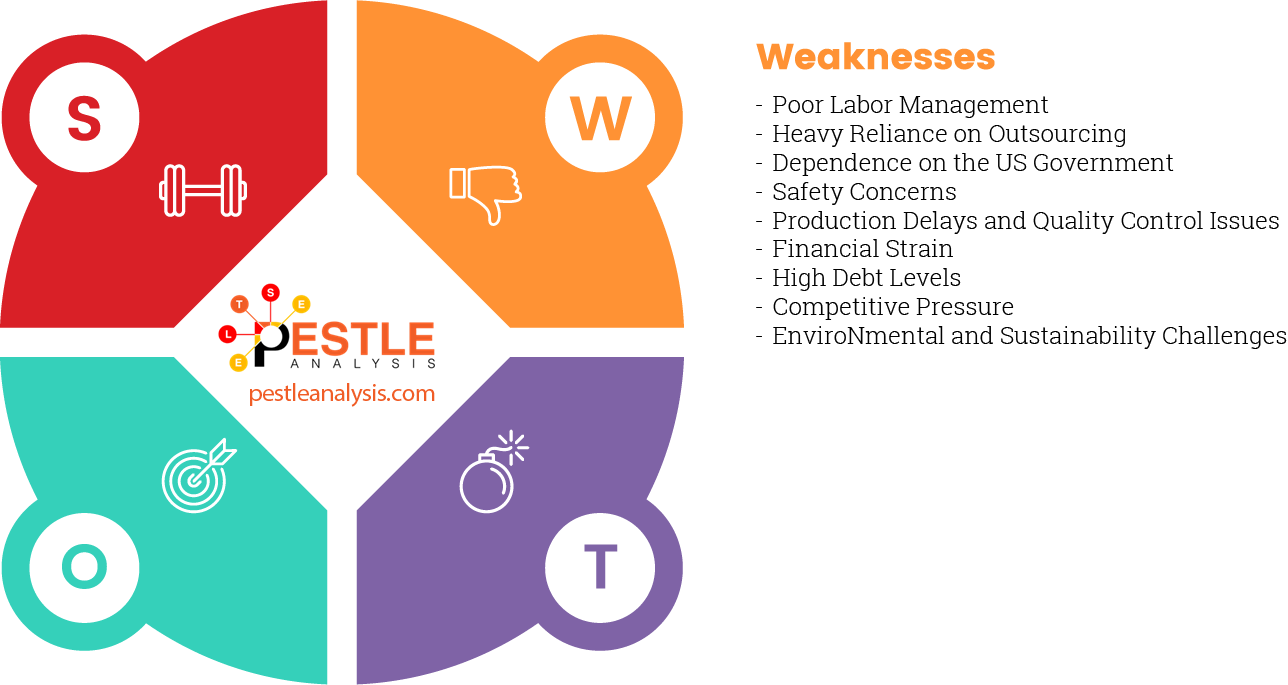
Poor Labor Management
It is always hard to manage labor in a company of this size. Boeing's labor force is spread throughout the world, and it adds up to a vast number; it is hard to maintain consistent standards across all of it. There are bound to be problems. Employees in South Carolina were fired over the formation of a union. Such situations can cause internal discrepancies inside the company and cause employees to revolt.
- Example: In 2024, Boeing had to temporarily shift engineers from its experimental X-66A project to focus on commercial plane development, highlighting challenges in resource allocation and project prioritization amidst tight delivery schedules and safety concerns.
Heavy Reliance on Outsourcing
As mentioned before, Boeing imports many of its raw materials and components from other countries; if there is any problem in the supply chain there, it can cause significant issues for the company. This is a contention that the company constantly needs to think about, and it can quickly turn into a huge weakness.
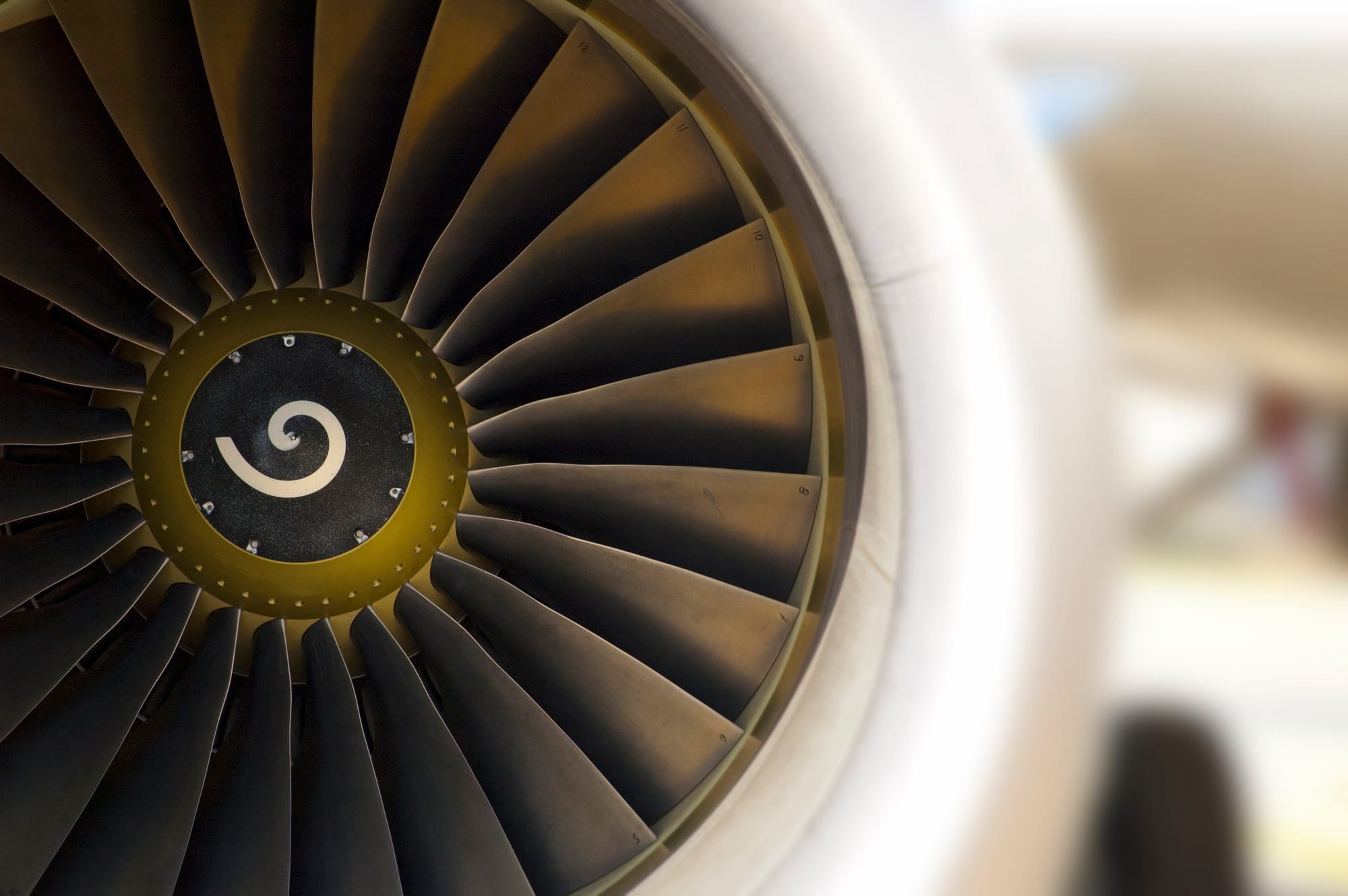
Dependence on the US Government
A big chunk of Boeing’s revenue comes from the contracts that it formulates with the US government; this factor puts the company under the constant influence of the economic and political climate of the country.
They have to comply with hefty policies and regulations that often make a company shift how it orders its operations.
Safety Concerns
One of the company’s airplanes, the Boeing 737 Max, has faced issues in the past when two of its planes crashed fatally over a similar malfunction. This was a major weakness for the company. Such incidents affect the trust that customers have in a company and leave a mark on the name.
Financial Strain
The grounding of the 737 MAX, combined with the financial impact of the COVID-19 pandemic, has strained Boeing's finances. This financial pressure can limit the company’s ability to invest in new projects and maintain a competitive edge in the market.
High Debt Levels
Boeing has accumulated significant debt in recent years, limiting its financial flexibility and increasing vulnerability to economic downturns or unexpected financial challenges. High debt levels can constrain strategic investments and operational initiatives.
Operational Complexity
The scale and complexity of Boeing’s operations, including managing multiple production lines and coordinating with numerous global suppliers, can lead to inefficiencies and operational challenges. Streamlining these processes is essential for maintaining productivity and quality.
Production Delays and Quality Control Issues
Boeing has faced several production delays and quality control problems, which have affected its ability to deliver aircraft on time. Such delays can frustrate customers and damage the company’s reputation, affecting future sales and contracts.
Curious about what weaknesses businesses need to watch out for? Head over to the complete list of weaknesses to consider in a SWOT analysis. It’s crucial to know where improvements can be made to stay competitive.
Boeing opportunities
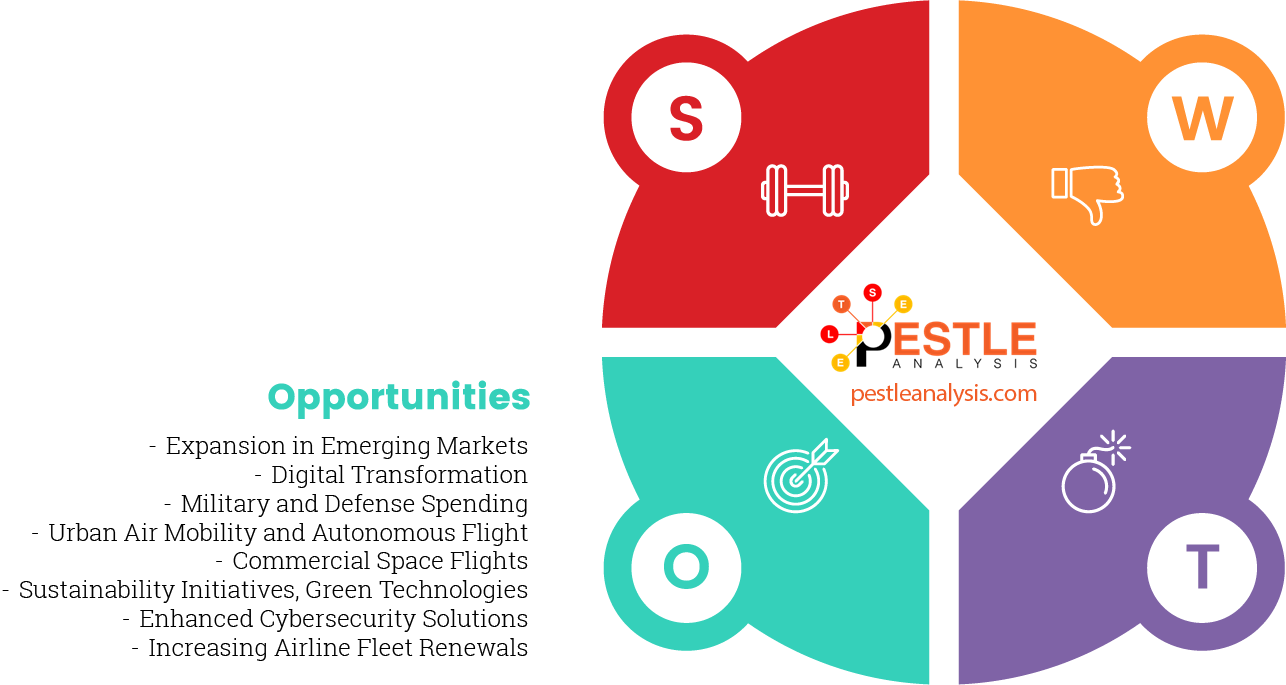
Military and Defense Spending
Global increases in military and defense budgets present a substantial opportunity for Boeing’s defense segment. Developing advanced defense technologies, unmanned aerial vehicles (UAVs), and next-generation military aircraft can secure lucrative government contracts.
- Example: In 2024, Boeing is ramping up production of sensors for the Patriot missile defense system by over 30% to meet increased demand amid geopolitical tensions and defense system shortages. This expansion can significantly boost Boeing’s defense revenue and strengthen its position in the military sector.
Digital Transformation
Embracing digital technologies such as artificial intelligence, big data analytics, and the Internet of Things (IoT) can improve Boeing's manufacturing processes, enhance predictive maintenance capabilities, and offer smarter, more connected aircraft. This can lead to increased efficiency and cost savings.
Urban Air Mobility (UAM) and Autonomous Flight
The development of urban air mobility solutions and autonomous flight technology represents a future growth area. Boeing can capitalize on its existing partnerships and technological expertise to lead in this innovative sector, potentially revolutionizing urban transportation.
Boeing has already showcased that they have an unlimited capacity for innovation. They have constantly strived to come up with new ideas and inventions that give them an edge over other competitors in the market.
An excellent example of this is how Boeing partnered with Uber to build air-taxis and with Porsche to make flying cars. They can expand further on these ideas to take them towards commercialization. They can also build on other such concepts and create new avenues for themselves.
Sustainability Initiatives and Green Technologies
As environmental regulations become stricter, there is a growing market for green aviation technologies. Boeing can lead in developing sustainable aviation fuel (SAF), electric and hybrid-electric aircraft, and other eco-friendly innovations, appealing to environmentally conscious customers and regulators.
Boeing, as a brand, is already thinking about sustainability and working to reduce its carbon footprint. They can make a multitude of efforts in this direction because of how considerably vast their brand size is.
They are already deploying fuel-efficient technologies. They have also been testing technologies that help lower noise pollution as well as harmful emissions. By making these efforts, the company contributes to a broader global effort of fighting climate change. This also proves significantly suitable for the image of the company.
Space Exploration and Commercial Space Flights
With increasing interest and investment in space exploration, Boeing can expand its involvement in this sector. Collaborating with space agencies and private companies for projects like space tourism, satellite deployment, and lunar missions can open new revenue streams. This is a fantastic opportunity for Boeing to invest in these projects and develop new products. If they exploit these opportunities fully, they can generate a good influx of money and profits for the company.
Growing Industry

The aerospace industry is growing globally, and that opens up many spaces for Boeing to retain its market share to achieve even more. This is a good opportunity for the company to increase its revenue. The market is only expected to grow more because of the growing technology and the fast-paced industry.
- Example: In 2024, Airbus announced a reduction in its delivery forecasts and a delay in ramping up production of its A320neo family due to supply chain disruptions and financial challenges. This situation presents Boeing with a significant opportunity to capture additional market share by addressing these gaps and meeting the rising demand for aircraft.
Strategic Acquisitions and Mergers
By identifying and acquiring companies that complement its core business, Boeing can expand its capabilities, enter new markets, and enhance its technological offerings.
- Example: In 2024, Boeing's offer to acquire Spirit AeroSystems for $4.08 billion aims to stabilize a critical part of its supply chain and improve production efficiency for its 737 fuselage. This strategic move could significantly bolster Boeing's operational stability and market position.
Enhanced Cybersecurity Solutions
With the increasing digitization of aircraft and aerospace systems, cybersecurity is a critical concern. Boeing can invest in and develop advanced cybersecurity measures to protect its systems and those of its customers, positioning itself as a leader in aviation security.
Leveraging 5G Technology
The advent of 5G technology presents opportunities to enhance in-flight connectivity, improve operational efficiencies, and support advanced manufacturing processes. Boeing can incorporate 5G into its operations and products to stay ahead of technological trends.
Interested in discovering what opportunities businesses can seize? Explore our comprehensive set of opportunities for a SWOT analysis. You’ll see how companies can grow and thrive by capitalizing on the right chances.
Boeing threats
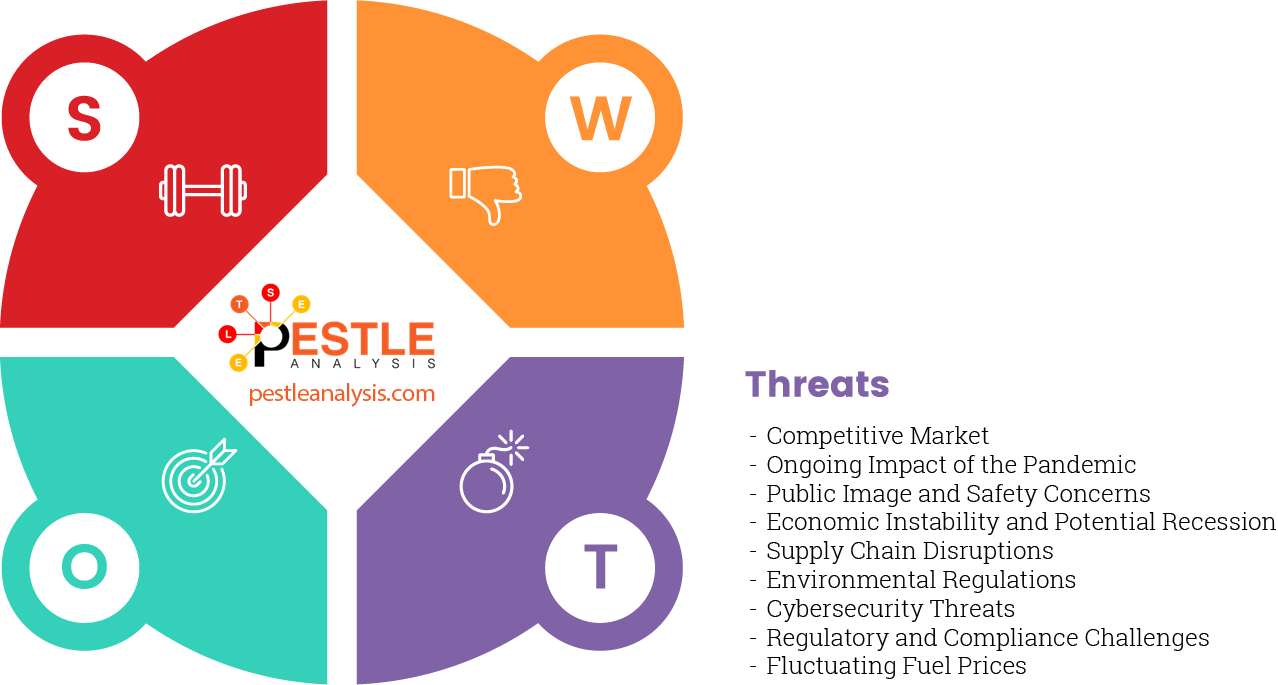
A Competitive Market
Competition remains one of the biggest threats facing Boeing. You could lose customers if you are not constantly thinking about establishing your company as a top shareholder in the market that manages to retain its consumer base by providing them with a unique value.
Losing customers is much more harmful in an industry like the airlines because one customer or order lost could mean a loss of millions of dollars. Airbus is one of Boeing's biggest competitors, and it also has strong backing from the EU. There is a clash between these two firms, so Boeing has to struggle to maintain its position constantly. Hence, this is a consistent threat to the company.
- Example: In 2024, state-owned planemaker COMAC has been identified as a potential disruptor to Boeing and Airbus's duopoly. COMAC's C919 jet, aimed at competing with Boeing's 737 MAX, is gaining attention, especially as Airbus struggles with production and Boeing faces regulatory scrutiny and production issues. This emerging competitor could significantly alter the market dynamics.
Regulatory and Compliance Challenges
The aerospace industry is subject to stringent regulatory requirements across different countries. Changes in regulations, stricter safety standards, and compliance costs can pose significant challenges for Boeing. Non-compliance can lead to fines, legal issues, and grounding of aircraft, affecting operational continuity and financial performance.
Ongoing Impact of the Pandemic
While the immediate effects of the COVID-19 pandemic have subsided, its long-term impacts continue to affect the aerospace industry. Reduced travel demand, changes in passenger behavior, and airlines' financial struggles have led to decreased orders for new aircraft. Additionally, the potential for future pandemics remains a threat to the industry's stability and growth.
Public Image and Safety Concerns
Going back to the crash of one of Boeing’s airplanes, such a fatal incident can highly concern the public regarding the safety measures of the aircraft and it can also heavily impact the image of the company.
People have also been fearing airplane hijacking and terrorist attacks, which negatively affects their perceptions of air travel.
- Example: In 2024, families of crash victims requested a U.S. judge to appoint a corporate monitor to oversee Boeing’s safety and compliance procedures, citing ongoing safety threats and regulatory violations. This legal scrutiny and the potential for further penalties highlight the ongoing challenge Boeing faces in restoring trust and ensuring rigorous safety standards, impacting both reputation and financial stability.
Economic Instability and Potential Recession
All around the world, countries are heading towards a recession, financial situations are dropping, and companies are going bankrupt. All of the airlines that purchase from Boeing are having a hard time staying afloat, so naturally, this will impact Boeing’s business as well. This recession has left no company unaffected, including Boeing.
The biggest reason it is hard to deal with the effects of the pandemic or the recession is the uncertainty of the situation; we do not know when things will be going back to normal or what normal will even look like after all of this is over.
Fluctuating Fuel Prices
The volatility of fuel prices impacts the operating costs of airlines, which in turn affects their ability to invest in new aircraft. Significant increases in fuel prices can lead to reduced airline profitability and lower demand for new, fuel-efficient planes from Boeing.
Environmental Regulations and Sustainability Pressures
Increasing environmental regulations and pressures to adopt sustainable practices present challenges for Boeing. The company must invest significantly in developing eco-friendly technologies and reducing its carbon footprint. Failure to meet regulatory requirements or market expectations can result in fines, operational restrictions, and loss of market share.
Geopolitical Instability
Geopolitical tensions, trade conflicts, and instability in various regions can disrupt Boeing’s operations and supply chain. Sanctions, export restrictions, and political conflicts can limit market access and affect the availability of critical components, impacting production schedules and costs.
Want to learn about the threats that can impact businesses? Check out our detailed list of threats to include in a SWOT analysis. Knowing these can help companies prepare and remain resilient in challenging times.
Recommendations and Further Studying Based on Today's Boeing SWOT Analysis
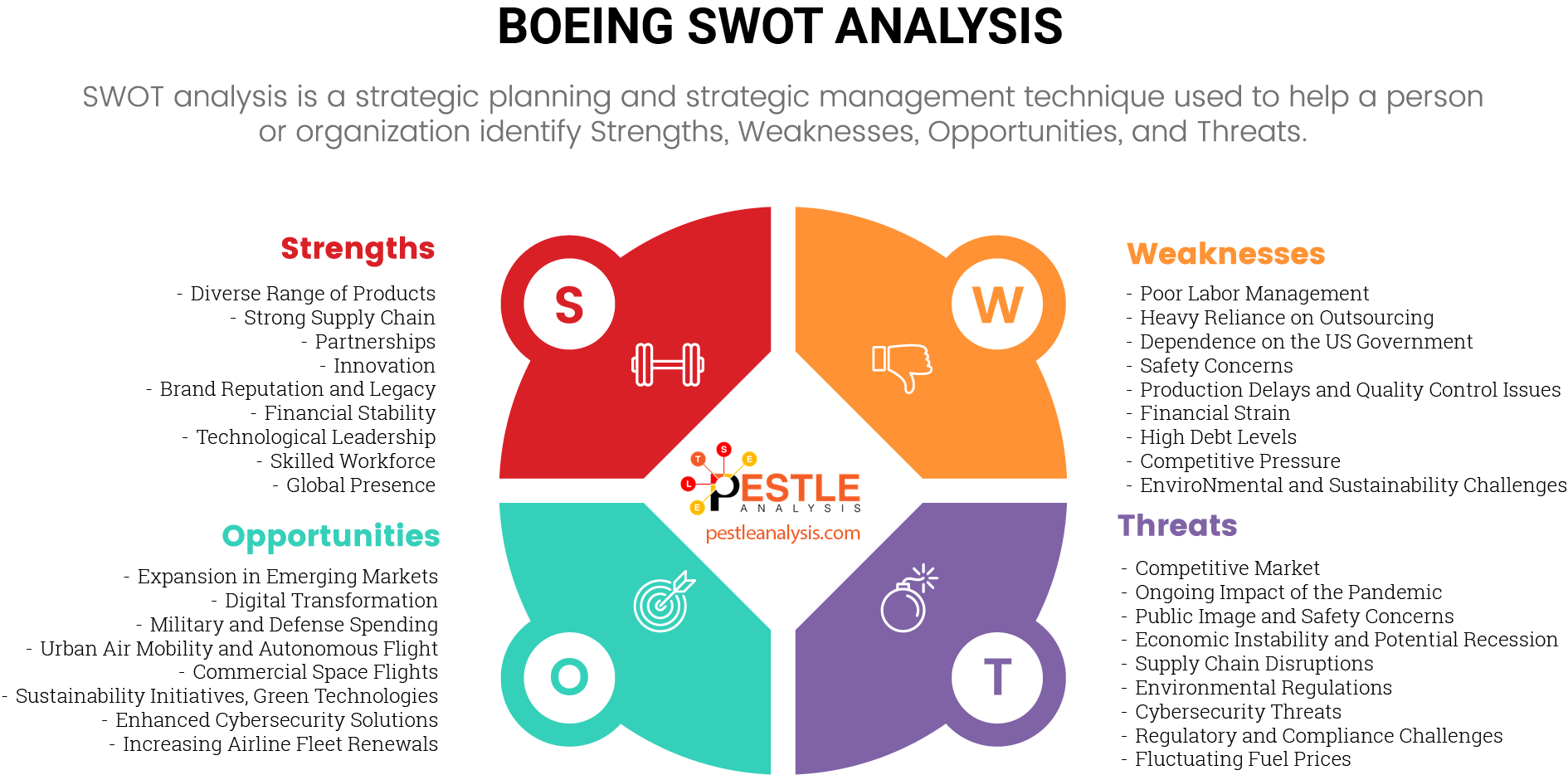
Alright, we’ve soared through Boeing’s strengths, weaknesses, opportunities, and threats, the four parts of a SWOT analysis and now it’s time to bring this SWOT analysis in for a landing with some recommendations.
- Leverage Innovation: Keep pushing the envelope on new technologies, like air taxis and sustainable aviation fuels. Staying ahead in innovation will help Boeing maintain its competitive edge.
- Strengthen Supply Chain: Focus on reducing reliance on external suppliers by improving internal manufacturing capabilities and securing critical components to mitigate risks of disruptions.
- Enhance Public Image: Continue to prioritize safety and transparency to rebuild and maintain customer trust. Proactively address past safety concerns and communicate these efforts effectively.
- Expand in Emerging Markets: Take advantage of growth in emerging economies by establishing stronger regional partnerships and expanding local presence to capture new market share.
- Invest in Digital Transformation: Embrace digital tools and technologies to enhance production efficiency, predictive maintenance, and customer service. This can lead to significant cost savings and improved operational performance.
- Focus on Sustainability: Ramp up efforts in developing environmentally friendly technologies and practices. This not only meets regulatory requirements but also appeals to increasingly eco-conscious customers.
- Enhance Cybersecurity: With the growing reliance on digital systems, investing in robust cybersecurity measures is crucial to protect Boeing’s data and systems from potential threats.
To further your research, dive into the PESTLE analysis I conducted on Boeing. This analysis will provide a broader view of the political, economic, social, technological, legal, and environmental factors impacting Boeing's business. Happy exploring!








